'I was heartbroken, I never thought I would find someone like her'
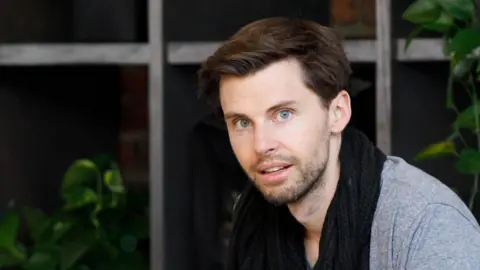 Hinge
HingeThe BBC's weekly The Boss series profiles different business leaders from around the world. This week we speak to Justin McLeod, founder and chief executive of dating app Hinge.
When recovering alcoholic Justin McLeod set up his dating app, it was to help him get over his heartbreak.
Five years earlier, his college sweetheart, the woman he thought was the love of his life, had split up with him because of his drink problem.
He had subsequently gone to rehab and successfully sobered up, but he had not been able to move on romantically.
Not comfortable going into bars because of his addiction issue, he started work on Hinge in 2011 to help him find a new partner. At the time he was 27, and doing an MBA (master of business administration) at Harvard Business School in Boston.
"I was heartbroken, and I never thought I would find someone like her," he says. But he thought that the app would give him a fighting chance.
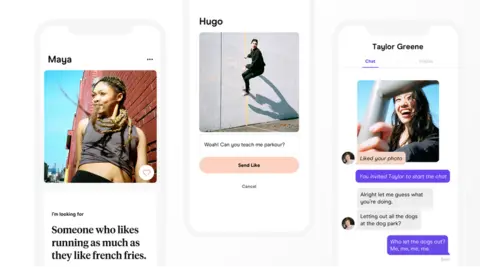 Hinge
HingeWith online dating services aimed at young people only just emerging at the time, Justin also hoped that it would be a business that he could try to make a success of.
"It got the wheels turning for me about an accessible, easy dating app for younger people, who at the time didn't use dating services at all," he says. "I couldn't get the idea out of my head."
So in 2012 Justin launched Hinge, the same year that rival Tinder was founded.
Today Hinge has about 5.5 million users around the world, and reported annual revenues of $5.2m (£4.1m).
But in a romantic story so fanciful that it was turned into a TV dramatisation, Justin didn't find a new love via his app. Instead, he was inspired to try to win back the heart of his lost love Kate Stern.
This chain of events started in 2015 when, promoting Hinge, he was interviewed by journalist Deborah Copaken for an article in the New York Times.
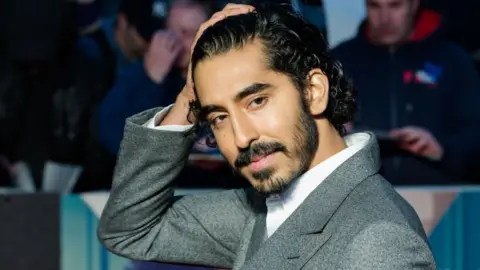 Getty Images
Getty ImagesAt the end of the interview Ms Copaken asked him if he had ever been in love. Justin opened up about how he had loved and lost Kate while they were both students at Colgate University in Hamilton, New York State, because of his alcoholism.
The journalist replied that she had a similar lost love story, but that she had never acted on it, and now feared it was too late.
"Her story encouraged me to go and give it one more shot, but it had been seven years and I thought it would be too late," he says.
But freshly emboldened, Justin flew to Switzerland, where he knew that Kate was by then living and working. Despite her being due to get married in one month's time, she agreed to meet him.
Within a couple of days, her wedding was off and she and Justin were back together.

More The Boss features:

Soon after, Justin met again with Ms Copaken to tell her what had happened, and she wrote about it for the New York Times' popular Modern Love column in November 2015.
"When the article was published in the New York Times, they said it was one of their most shared and talked about columns," says Justin.
"They even wrote a follow-up about whether people should go and try and find their long-lost loves."
When the Modern Love column was turned into an Amazon Prime TV romantic drama series of the same name last year, Justin and Kate's story was adapted for one of the episodes. He was played by British actor Dev Patel.
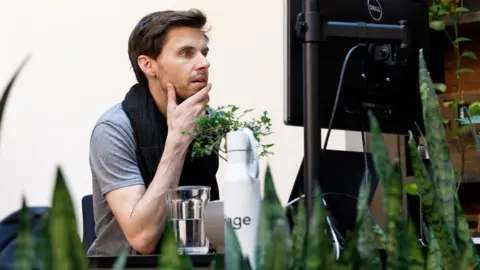 Hinge
HingeJustin says that getting back together with Kate made him realise that he needed to reboot Hinge, which at the time was based on the same "swipeable" model as Tinder.
He wanted Hinge to be more romantic, to move past simply connecting people who are physically attracted to each other. Instead he wanted users to properly get to know the other person, to encourage them to go on old-fashioned dates, and for them to establish long-term relationships rather than a "hook up".
Since the reboot in 2016 users are asked to complete a number of statements or "prompts", such as "On my bucket list is...", or "The fact about me that surprises people is...". Their answers are then displayed below their profile. The aim is to help users to find a personality they like, and start conversations.
"It felt like a small thing, but it really changed people's behaviour on the app," says Justin, who was born in Kentucky. "It made them more selective, and more thoughtful about what they put on their profiles.
"Over time we've learnt which prompts lead to more dates."
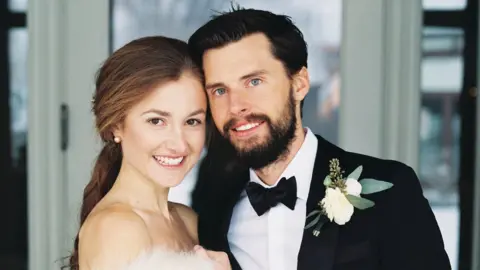 Stephanie Williams
Stephanie WilliamsSaskia Nelson is the founder of Hey Saturday, a UK and US photography business that concentrates on dating profile pictures. She says that Hinge has grown in popularity thanks to word of mouth.
"It appeals because of Hinge's focus on quality matches over quantity," she says.
Hinge now has more than 70 staff based at its New York office. While the basic service is free, it makes its money from charging for premium membership. This gives users added perks, such as being able to see more information on potential dates.
In response to coronavirus, in early April Hinge introduced a new function called "date from home", whereby users can say that they'd like a video date with someone. This is only revealed to the other person if he or she would also like to do this with that individual.
Justin says he wants Hinge's users to have the same happy ending to their love stories as he and Kate did.
The couple got married last year, and recently had their first child.
